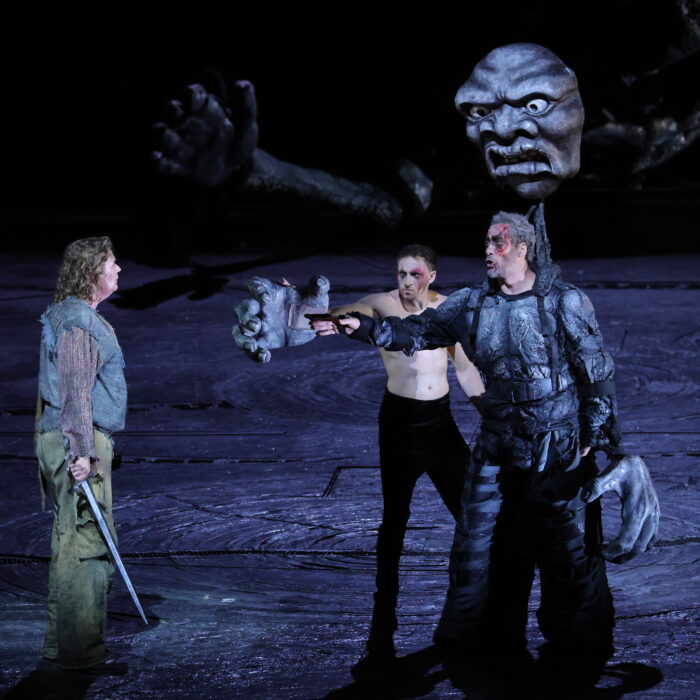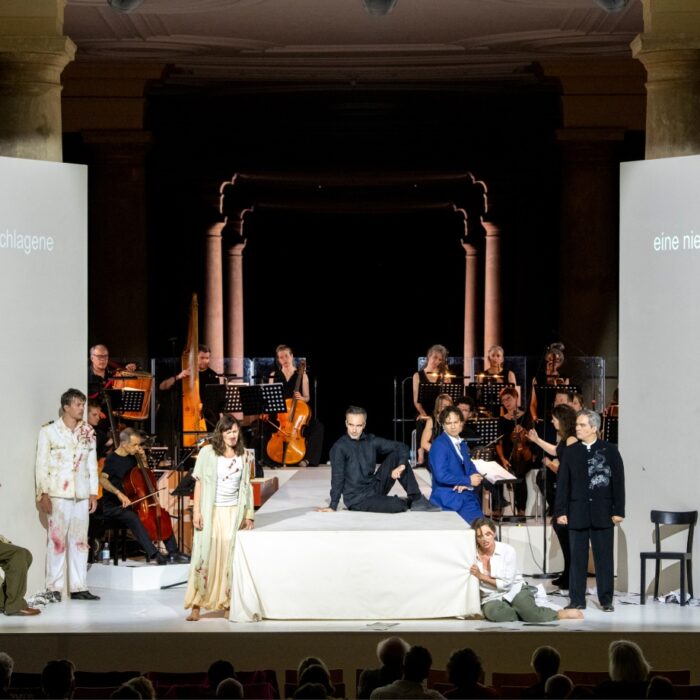
Florida Grand Opera 2024-25 Review: The Magic Flute
FGO’s Opening Night Gives Way to Fantasy
By Afton Markay(Photo credit: Lewis Valdes)
Opening night of “the new FGO” sought to pique the interest of multiple generations by combining the magic of Mozart’s “The Magic Flute” with the unique fantasy world building of role-playing games, like Dungeons and Dragons.
In this production, director Jeffrey Marc Buchman took full advantage of the creative liberties bestowed upon the leader of a role-playing game. Scenic Designer Stephan Moravski, Video Designer Greg Emetaz, and Robert Wierzel’s lighting design brought Buchman’s vision to life, along with the costume and makeup designs by Camilla Haith and Brittany Rappise, respectively. Together they created an almost entirely digital set that was truly awe-inspiring. The stage seamlessly transformed into an intricate and labyrinthine world throughout the show. The digital effects and cohesion between the lighting and costumes were only the starting line for the magic created by the entirety of the cast and crew.
A Fine Line
Blending historic works with modern technologies is an innovative way to preserve source material while catering to a modern audience. In doing this both elements need to be on an equal playing field. The musicianship was top-notch and so was the design, but at times they didn’t mesh.
Queen of the Night, Laura León gave a bombastic entrance, with myriad of effects setting her up for a larger-than-life portrayal. Léon’s fiery coloratura was a perfect fit for the role. However, there was a disconnect between her vocal energy and outward personification. Vocally she embodied the character to a tee, but the other aspects of the role were lost. A skilled performer matched with exceptional staging should lead to a great performance, but in this case, something was left to be desired.
Yet, the indulgence in opera and video game tropes is where this crossover worked. In scene one, Tamino sung by Ricardo Garcia comes face-to-face with a fire-breathing dragon – aesthetically nothing less than full-on fantasy. In Garcia and Sara Kennedy’s (Pamina) Act two duet, “Tamino mein, o welch ein Glück!” the couple is met with giant lurching men-at-arms before facing their trials. This stylistic choice hit the mark, as did their serenely intertwining timbres.
The Three Ladies sung by Avery Boettcher, Mary Burke Barber, and Monique Galvão fueled the opera trope with a Valkyrie-esque pomp. Never once did they stray from excellence. Their alignment vocally appeared natural and effortless. The individuality the singers brought to their respective roles made each one shine, and left plenty of room for the Ladies to play off of one another’s energy. Altogether the trio gave a charismatic performance.

Vocal Excellence
Alex DeSocio masterfully exhibited all aspects of his voice in the role of Papageno. His hefty baritone matched with a range of comical expressions made for a highly entertaining performance. When partnered with Sydney Dardis as Papagena, the stage was illuminated with energy. The rollercoaster of “Pas” was impressively clean and captivating. The troupe of little Papagenos and Papagenas amplified the joy of the scene.
Andrew Potter was born to sing the role of Sarastro. Potter’s soothing basso beautifully matched his poised demeanor, and precise diction. His Act one aria, “In diesen heil’gen Hallen,” was thunderous, yet serene. In ensemble scenes, Potter provided a sturdy foundation for the harmony that established a way for individual voices to ring out without overpowering others. This display of chiaroscuro was most evident when hearing Potter’s richness and Garcia’s bright tenor blend. As a soloist, Garcia brought a tenderness to the role. He finessed a range of dynamics that gave originality to each aria.
Worth another mention is Sara Kennedy’s Pamina. She breathed grace and passion into her performance. Kennedy’s elegant lines gave way to raw emotion heard in her voice was heard throughout, but was palpable in “Der, welcher wandert diese Strasse voll Beschwerden.” Her off-stage call to Tamino was filled with gut-wrenching longing. Kennedy’s refinement of the passaggio was demonstrated with ease. Unsurprisingly, “Ach, ich fühl’s” is where she shone brightest. Kennedy and conductor Christine Brandes worked fluidly through the aria brimming with rubato.
The cast was rounded out by David Margulis as Monostatos, Spirits Kornel Racz, Christian Burbach, and Sophia Cavaretta, Speaker Neil Nelson, and priests James Mancuso and Alexander Kolyszko. Each gave an enjoyable presentation. The ensemble numbers were balanced and full of grandeur.
On the Right Track
Opera is the perfect conduit for world building, and with modern technology, the possibilities are truly endless. The fanciful nature of “The Magic Flute” coheres with the nature of the role-playing genre, therefore, this direction was a smart choice. The parts of this production that worked were extraordinary, but some elements felt redundant. With refinement, this production could be groundbreaking for a new generation of opera audiences.


